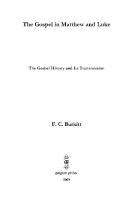The Gospel Canon: The Gospel History and Its Transmission 9781463217211
Originally delivered as one of the Jowett Lectures for 1906, the contents of this booklet emerged during the first quest
333 83 2MB
English Pages 36 Year 2009
Recommend Papers

- Author / Uploaded
- F. Crawford Burkitt
File loading please wait...
Citation preview
The Gospel Canon
Analecta Gorgiana
151
Series Editor George Kiraz
Analecta Gorgiana is a collection of long essays and short monographs which are consistently cited by modern scholars but previously difficult to find because of their original appearance in obscure publications. Carefully selected by a team of scholars based on their relevance to modern scholarship, these essays can now be fully utilized by scholars and proudly owned by libraries.
The Gospel Canon
The Gospel History and Its Transmission
F. C. Burkitt
gorgias press 2009
Gorgias Press LLC, 180 Centennial Ave., Piscataway, NJ, 08854, USA www.gorgiaspress.com Copyright © 2009 by Gorgias Press LLC Originally published in 1911 All rights reserved under International and Pan-American Copyright Conventions. No part of this publication may be reproduced, stored in a retrieval system or transmitted in any form or by any means, electronic, mechanical, photocopying, recording, scanning or otherwise without the prior written permission of Gorgias Press LLC.
ISBN 978-1-60724-120-1 ISSN 1935-6854 This volume is an extract of the Gorgias Press edition of The Gospel History and Its Transmission, third edition, originally published by T. & T. Clark, 1911.
Printed in the United States of America
VIII.
THE GOSPEL CANON. H E actual process by which our Four Gospels arrived at their present rank of pre-eminence is quite obscure. From about 170 AD onwards the Gospel Canon enjoys practically unchallenged supremacy, as we see from Tatian's Harmony, from the document known as the Muratorian Canon, and from S. Irenaeus. Somewhat earlier than Tatian must be placed an interpolated edition of the Four Gospels, which seems to have been set forth in Rome, and from which the more important 'Western Interpolations' in Greek and Latin Biblical M S S are ultimately derived. This brings us back to about 1 5 0 ; but the literary history of our Gospels during the first half of the second century is unknown. Justin Martyr doubtless used all the Four in Rome about the middle of the century, and Marcion certainly used L u k e about 1 3 0 - 1 4 0 . Earlier still are the allusions which indicate a use of Matthew by S. Ignatius. But there is nothing 257
[1]
THE GOSPEL HISTORY to shew that Marcion was acquainted with any other of the Canonical Gospels than Luke, and very little to shew that S. Ignatius used any other Canonical Gospel than Matthew ; while the verbal inaccuracy of Justin's quotations suggests that even in his day the ' Memoirs of the Apostles' had hardly yet taken their place beside the L a w and the Prophets as part of the written Word of God. A t the same time, Trypho, Justin's Jewish opponent, is quite aware that the way to become acquainted with Christian doctrine is to read what is written ev raj \eyo/ievq> evayye\i









